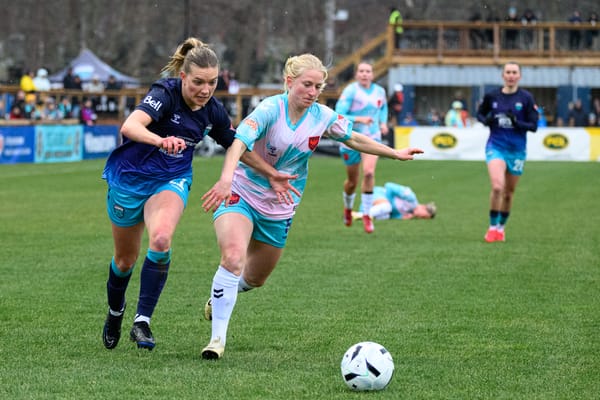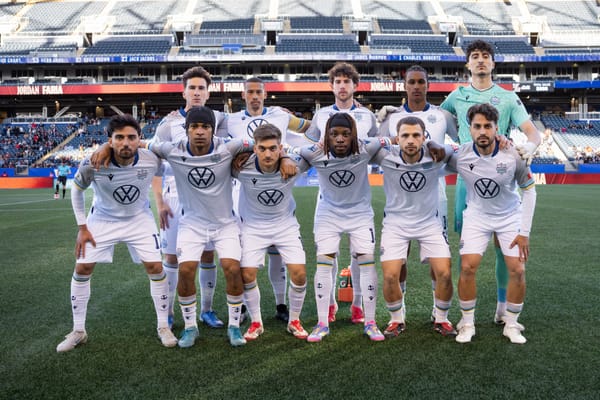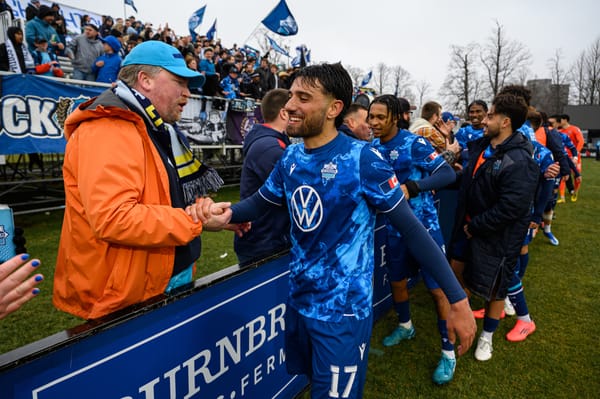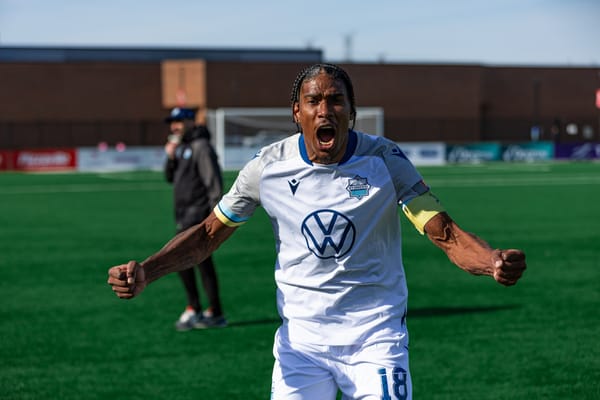Q&A with CPL executive vice-president Costa Smyrniotis

CPL executive vice-president Costa Smyrniotis is in the thick of the league's off-season.
Given his role, with a focus on football operations, the last several months have kept Smyrniotis and his staff busy as they've helped process countless contracts, free agents and transfers. He recently spoke with this publication's editor and reporter, Josh Healey, about how the league assists clubs, the machinations of transfers and what's in store for Canadian football fans in 2026.
JH: Hey Costa. Just to kick things off, and get the conversation started, can you explain what your role as executive vice-president of football entails?
CS: Yeah, there's a lot there. Ultimately, it's to oversee the overall strategic direction and where we go from a football sense. That's the most important piece, obviously, working with the leadership of our commissioner (Mark Noonan) and the board here, in terms of the big picture. Who are we and what do we want to be, how do we connect locally to the international game? This is all the big picture stuff in terms of ensuring football is always first with everything that we do here. We make decisions — whether it's on or off the field — with the game always in mind.
It's very big picture, ultimately, to ensure then that the strategic direction kind of gets pushed down (through the organization) for us to be able to manage it operationally on the day-to-day and to be able to see great CPL action.
JH: You kind of answered my next question there: how granular do you you get in your role? For example, with Grady McDonnell's transfer being announced, is that the sort of thing you'd have your fingerprints on? Or are you more dealing with things like ensuring MLS and CPL have the same transfer window this year?
CS: Yes, ultimately, that's part of the overall vision in terms of raising the standard of play and how do we go about doing that, what's our picture to the outside world, how do we actually interact with the outside world and bring more eyes to our league, our players and our talent, and trying to use the relationships in place to bring a lot of that to fruition. You're almost an advisory type group for our clubs. This isn't the league south of the border in the sense where everything is centralized, contracts are centralized. Here, the clubs make their own decisions and are able to come to the league to get advisory services how best to deal with different situations, how best to deal with legal, with compliance, FIFA matters when it's in international scope.
Ultimately, it's the clubs putting together all that great work. They're responsible for their transactions and what they do but they've got to work in the overall parameters of where we want this league to go.
JH: Obviously, we're still in the off-season but things are picking up. We're only a week away from CONCACAF Champions Cup. Would this qualify as your busy time in your role with transfers coming in, transfers going out, approving contracts and that sort of work?
CS: We have a small team that manages those matters on the operations side that supports the clubs. The clubs reach out and want to take part in activity. We've seen a lot of free agents come into the league this year, we've seen some transfers and some really good business done. That's where our small team supports the clubs to be able to allow them to move forward with anything they want to do. We're already looking at 2026 and beyond. 2025 is pretty much baked in operationally, with things getting done to ensure clubs are all set to go.
But we're already looking at 2026 when it comes to schedules and what we want this league to be. We have to look a few years out to look at expansion and different topics: competition structure, our relationship with CONCACAF, expanding our presence within their competition and relevance. Those are kind of the day-to-day things, which is looking out a few years, while the rest of this stuff gets done here in cooperation with our clubs.
JH: That would be the football operations department that you alluded to that deals with club matters, transfers, signings and all that. How big is that team? I wonder if people have an idea of the scale and size of what you guys are working with.
CS: There's a group of about five or so people who handle everything in between match operations to club support on the football side.
JH: Those must be five very busy people.
CS: They definitely are. There's obviously a lot to do and they do a tremendous job. Ultimately, they're there to support the clubs and to ensure they're successful on the field.
JH: I'm always really curious how the actual mechanics, from a league perspective, work to have a transfer go through for a player like McDonnell, using him as an example. Let's say, when Vancouver FC gets a formal written offer for a player like Grady McDonnell and they like it, what needs to happen on your end for a press release to come out to say the deal is done and dusted?
CS: We talk about overall strategic direction. One is we've got to create the environment to make these young talents — or guys a little bit older than that that make (CPL) their league of choice — to come in, play, succeed and be able to be in the spotlight. Whether it's the (transfer) you just mentioned, or Kwasi Poku last year, which was obviously a very big one, you're starting to see it. We're also starting to see it with Shola Jimoh in York United as well. You're starting to see a lot more of this where there's an overall plan in terms of development, there's a plan to get competitive minutes, building a profile and from there, the clubs have to do the job of managing that over time. As more and more people pay attention to the league, we're building a more strategic vision of what those things need to look like in terms of transfers out of the league and how best to handle them and that's where our team can come in and support them.
Ultimately, clubs are responsible for the negotiations (with perspective buyers). They're responsible for terms, they're responsible for getting to the point where they're pretty happy. We provide — whether it's the legal services or compliance type services — to turn something that's scratched on a small piece of paper into something that's recognizable, something that's black and white, something legal and enforceable. There, we're pretty much at the end of the line and all of the hard work is coming from the clubs to be able to get there.
JH: So, for example, the league would have a legal department to run that contract and transfer through before it can be ratified to be made an announcement?
CS: Yes. These are the areas where you try and ensure everything is done correctly. And you have a counter party as well, so you're dealing with their side throughout the process in order for this to come together. This is just the normal process in the football world.
JH: How long does this process take, from beginning to end?
CS: I think it all depends on the case. If all the work has been done ahead of time, then it could be instantaneous. But, often, it's not that simple. There's two parties and sometimes one side forgets what they agreed to the day before and then remembers something different the next day and then you're in the back and forth negotiations. And that's where things get stuck: it's stuck in the back and forth between clubs because, ultimately on this side, it's not about a negotiation. It's about ensuring it's papered correctly and that our clubs are protected going forward. It could take a few hours and, as you see now with a lot of the windows closing on the other side of the world, deals today will get done within an hour or two while others have stretched for weeks because there's negotiations, opportunities that show up. But each situation is very different.
JH: You were announced April, 2023, meaning you've been in your role for a couple of years now. Have you noticed an increase in conversations like the one we just had for Grady McDonnell, for example? You alluded to earlier Kwasi Poku being sold, Matteo de Brienne was sold. From your chair, are you seeing an increase in interest for CPL players?
CS: Definitely, and I think it's a case of that's just normal. This is what should have been taking place for a long time but we didn't have a domestic league for it to take place with. I think it's part and parcel of the great talent we have in this country, the opportunity they're afforded to play at a high level and to build a name for themselves and to develop. It's about being able to showcase them, playing in big matches in front of fans, under pressure, and being able to play in CONCACAF matches against some of the giants of the region. These are the building blocks of getting to these opportunities. We've seen success from those who have put in the effort and we're starting to see it across the board.
Using Vancouver FC as an example, it's great. They want to be the club of choice for every player in British Columbia and they want to fly that flag. I think that's excellent. By stating that and putting in the work and having the examples of how it comes together, it is an excellent situation. I think every young player in the province is going to look at that club and say: 'I want to be the next one.'
JH: Shifting gears a little bit here, I believe last year was the first year the league had done an internal audit with all the clubs to make sure they were cap compliant. Can you talk about how that process is managed and what time you reach out to clubs to start that and how it looks like from a workflow perspective on your end?
CS: There's a formal process and it's been going on for years in terms of multiple check points throughout the year to ensure everything is moving in the right direction. Our team here will help support and help clubs when they're dealing with injuries, help clubs if they see a possible transfer happening. There's support throughout the year, there's communication throughout the year and there's checkpoints throughout the year to ensure everybody is moving in the right direction.
JH: We're still some weeks away until training camps open across the league. At this time, are you able to say where clubs are trending in terms of being cap compliant?
CS: It's still early days but if I follow every other year, everyone's managing a good ship within their club. It's business as usual when it comes to that front.
JH: Okay. I did want to ask about the salary cap increase as well; the commissioner has alluded to it but I don't think there's been a formal announcement. At what point, as a league, are you able to communicate those changes with the clubs so they know ahead of time where they sit?
CS: This happens well in advance. Obviously, there'll be a public announcement coming shortly in terms of the 2025 season but a lot of times these are done a year in advance. The big picture planning parameters are put in well in advance so that everyone can properly manage their rosters.
JH: Speaking about rosters, last year you guys tweaked rules around roster slots, U-21 players and how that sort of worked with providing some cap relief. How do you take in feedback from clubs to alter roster rules? Is it about finding a sweet spot to foster young Canadian talent while including international players?
CS: I think it's always the best when there's that cooperation and feedback and an understanding of what's going on in the background. All of our markets are different; what works in Halifax may not work in Vancouver. You've got to take the overall strategic direction and goals that you want in place and you've got to find a way to understand the local realities and create a solution that works for everybody. It may not be the perfect solution that works for an individual club but ultimately, for the collective, it's the right direction. You've seen that on a lot of the initiatives we've set up on the youth side. It's also giving them the opportunity to build a larger pool of players to be able to work with.
Most importantly, it creates an environment over time where a player goes from a talent, to the next one to the one. That's the important piece. We have to give our clubs the environment and the process and the space to be able to do that. And I think that's been the reward over the last few years: we're seeing it come to fruition on our clubs' rosters.
JH: What are some of the lessons you've learned in your current role?
CS: I think it's just localizing a lot of the stuff that makes sense globally. Some of the stuff that makes sense, and is normal practice on the day-to-day basis dealing with international and national aspects, I was figuring out how to localize it. Part of it all is saying hey, here's normal practice and how things get done. Here's how Manchester deals with Paris Saint-Germain or vice-versa. How do we take all that and ensure it becomes common practice over here but ensure that it's truly Canadian, that it makes sense with what we have to work with in this country and the opportunity we have.
JH: Okay, only two more questions from me. You mentioned localizing things for each individual market. How important is that process when you're qualifying potential expansion sites, be it for Kelowna or Windsor or Québec?
CS: First and foremost, you do need the conditions in each market to be successful. I say sometimes let's get all of the off field stuff right to create that foundation for success and we'll get the football right. I'm confident in the talent across this country and confident in a lot of the people working daily in this sport across this country. I think if you can marry those two things in the best possible way while ensuring we have the best conditions to be able to be successful off the field, then we can turn it into something really nice on the field as well.
JH: We saw some of that with the CPL on Tour in Kelowna? I think it was the largest event at Kelowna's Apple Bowl ever.
CS: And that's a great example of what that can look like. It's a great example of markets wanting to be part of what we're doing going forward. I think it was just great for our league and great to show our game to different parts of the country. And that's the other part we have: this is a very big country. We obviously have a lot of different population pockets concentrated across the country. That's our opportunity to fill in the geography to get the different parts of the country and that could be through CPL clubs or through our League1 structures, which covers even more geography and builds up even more excitement for this game.
JH: Speaking about excitement, you talked about some of the planning that's already underway for 2026. Is there anything you can share about what fans can expect heading into the FIFA World Cup year?
CS: I think it's similar to what I just finished talking about. That's going to be our big opportunity to kind of be supportive of the event and cheer on our national team. I think everybody's going to be one big collective at that point and within our communities, within our clubs, and again, whether it's at a CPL or League1 level, to be able to celebrate the game during the World Cup together within these communities, that's our responsibility to want to take on and to bring all fans of the game together.
At the same time, they understand, going forward as this excitement builds, some of them have been to our games and some of them are going to get introduced to our league as well. It becomes contagious after a while. I think that's going to be the key thing in terms of what we do in 2026 and sets the stage for what we do beyond the tournament. We always remember it's great that there's the World Cup coming, the biggest tournament in the world, but the most important thing is what happens the day after that tournament ends. That's the part I'm really looking forward to.
JH: That's all the questions I had prepared ahead of time, Costa. Is there anything you'd like to add that I maybe didn't ask?
CS: We often talk a lot about the stuff on the field because that's what's important to me but ultimately, it's the eco-system and the opportunities that exist to be able to talk about our game and help us spread the word about the game throughout the country. We're also a resource. Where we can share some of our experiences, where we can share some of where we're headed in this game, then we can tell an even bigger and better story going forward.
JH: Fantastic. Thanks for your time, Costa.
CS: Thank you.
Editor’s Note: This interview has been condensed and edited for clarity.
Cover Photo Credit: Kenny Edwards / CPL




